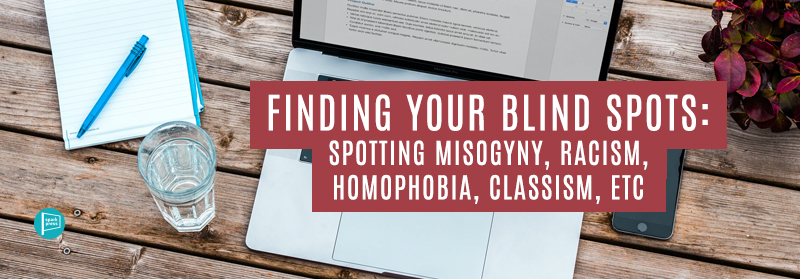
Writing is the ultimate practice of empathy. Often, authors write from the perspective of characters and include characters that are completely different from the author’s background and identity. Even with research and the best intentions, sometimes there are blind spots that authors do not recognize. These blind spots could manifest into any combination of misogyny, racism, homophobia, classism, ableism, and more expressed within the work.
What Are Blind spots/Unconscious Biases?
A blind spot and an unconscious bias are similar in that they are both a lack of awareness about a facet of one’s actions and beliefs. However, a blind spot specifically targets feelings that are painful to the individual. Unconscious bias simply focuses on the lack of awareness of a person’s actions.
According to Georgetown, unconscious bias happens without a person even realizing it, even if it goes against their professed beliefs and values. Research has proven that this unconscious bias hinders decision-making for medical diagnosis, due to making assumptions based on race, instead of assessment.
The American Psychological Association states that a blind spot is a lack of awareness about your behavior, because realizing these feelings or behaviors would result in personal pain.
How to Spot Them
Having Diverse Readers
Beta readers are early readers of your work who make general suggestions for improvement. They typically are comprised of the author’s target audience. Having diverse beta readers for reducing blind spots means that readers with similar backgrounds and experiences to characters (yet different experiences than the author) will be able to suggest scenes to make the depiction more authentic. They can also point out inauthentic or upsetting depictions. For more on beta readers, click here.
Sensitivity readers trained professionals who will read your manuscript for stereotypes, word choice, and other language that may hurt people from groups the author is trying to represent. They usually specialize in groups that they represent. These groups could include their gender, romantic or sexual orientation, race, ethic group, disability, and more. Sensitivity readers will help identify potential issues with more critical and specific lenses than beta readers. For more on sensitivity readers, click here.
Research/Educating on History and Current Events
Part of the issue with blind spots is not realizing a harmful stereotype exists within your writing. Researching common stereotypes associated with the groups that you are attempting to represent, and purposefully avoiding them, will help the characters come across as authentic and inoffensive. Understanding history and current events, even for a contemporary or sci-fi novel, helps the author avoid historical inaccuracies and stereotypes referenced within the work. Additionally, understanding the current and past struggles that people within these groups have overcome will help create everything from sensitive and accurate characters to worldbuilding and history in sci-fi and fantasy.
Diversifying Your Reading
Expanding your reading horizons by reading works by authors with diverse backgrounds will not only help with understanding people who come from different backgrounds. It can also help critical thinking in the physical world. Understanding how laws and personal actions in the real world affect real people, will help you confront systemic racism and personal bias that is present within our world. Confronting your own real-world bias will help equip you to confront your work’s bias.
One work that helps with identifying your own stereotypes is looking at Toni Morrison’s short story Recitatif. The story plays with racial stereotypes between the two main characters. Throughout the story, ask yourself what race you think each character is and why. No physical descriptions are ever written.
Respect People’s Experience
Controversial themes and words are not something to be only briefly mentioned as filler. Material that is sensitive deserves to be treated with more respect than being brought up for the sake of a joke or to make a character dislikable. People’s lives and experiences deserve to be treated with more respect. Even if character’s opinions do not reflect the authors, confronting and addressing even controversial opinions in text will matter to those who the opinions affect. For example, using racist characters as antagonists means that their racism will have to be addressed and held accountable.
Trust the Process
Sometimes, the best way of finding your blind spots is getting it wrong and being called out. Being willing to be wrong when representing others is important, otherwise characters would all have the same background. Discovering your own blind spots requires self-reflection and time and is continually ongoing. Nikki Giovanni said that “Mistakes are a fact of life. It is the response to the error that counts.” Getting it wrong doesn’t inflict on what kind of person you are—but what you do after getting it wrong matters more.

Leave A Comment